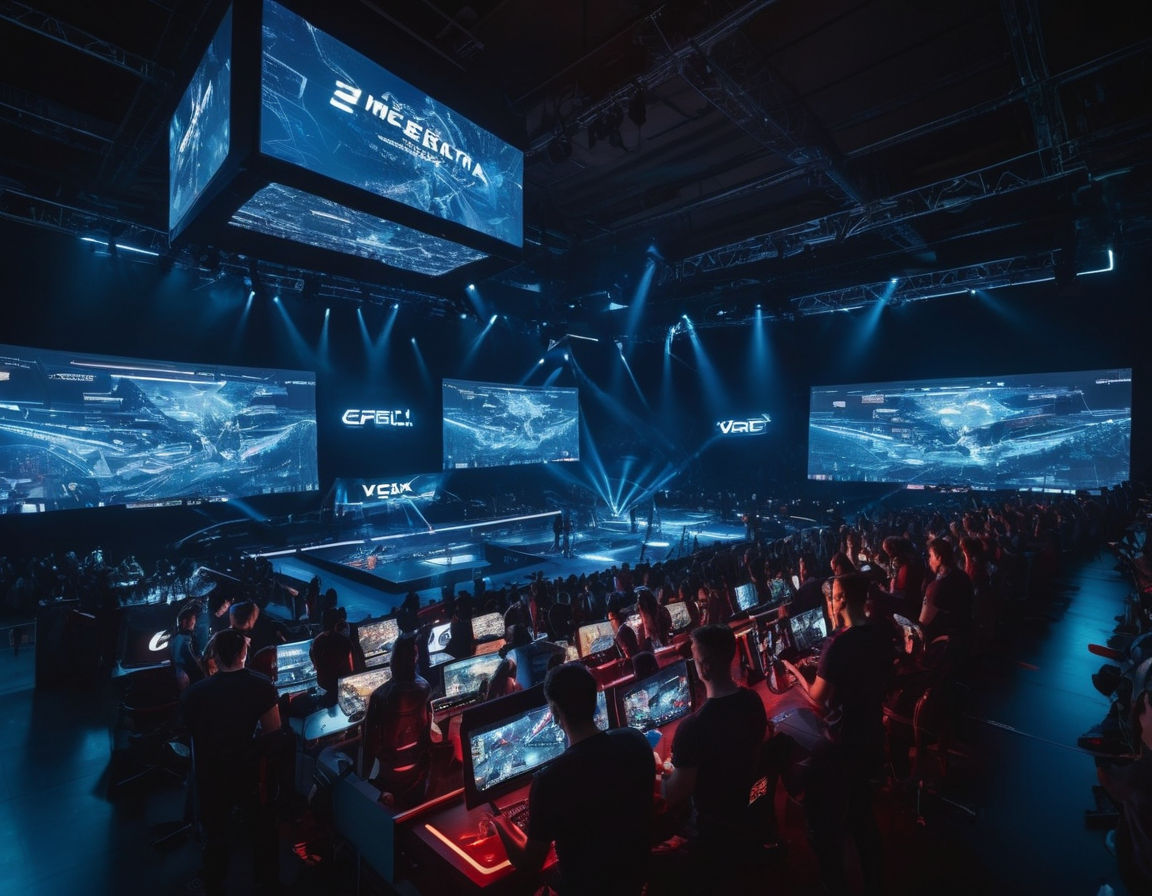Introduction
Esports Growth has been a significant phenomenon reshaping the landscape of the gaming industry. The competitive world of Esports has rapidly gained mainstream popularity, captivating audiences worldwide and revolutionizing how people view gaming. This article delves into the pivotal role of Esports in the evolution of gaming and explores the key events and future trends that have propelled competitive gaming to the forefront of entertainment.
What is Esports?
Esports, short for electronic sports, refers to competitive gaming where professional players compete individually or in teams across various video games. These competitions are often organized into leagues, tournaments, or events, attracting massive audiences both online and offline. Players showcase their skills, strategies, and teamwork, akin to traditional sports, but within the virtual realm of video games.
History of Esports
The History of Esports traces back to the late 20th century when competitive gaming tournaments started to emerge. From humble beginnings in arcade halls and small LAN parties, Esports gradually gained momentum, with titles like “Starcraft” and “Quake” paving the way for organized competitions. The early 2000s saw a surge in popularity with the rise of big-budget tournaments and the professionalization of competitive gaming. Over the years, Esports has grown into a global phenomenon, attracting mainstream media attention and massive prize pools.
Early Days:
Emergence of local tournaments and LAN parties.
Pioneering games such as “Street Fighter” and “Counter-Strike” shaping the competitive scene.
Growth Phase:
Introduction of professional teams and sponsorships.
Global expansion with esports leagues and international tournaments.
Impact on the Gaming Industry
Esports has had a profound Impact on the Gaming Industry, shaping trends, technological advancements, and audience engagement. The symbiotic relationship between Esports and the gaming industry has been mutually beneficial, driving innovation, market expansion, and community involvement. Esports has not only influenced game development but also revolutionized marketing strategies and consumer interactions within the gaming ecosystem.
Influence on Game Development:
Developers incorporating esports-friendly features for competitive play.
Emphasis on balance, meta-game, and spectator experience in game design.

Market Growth:
Increased sales and recognition of esports titles.
Expansion of esports merchandise, digital content, and in-game purchases.
Community Engagement:
Rise of streaming platforms like Twitch for live esports coverage.
Enhanced interaction between players, fans, and gaming communities.
In conclusion, Esports Growth has transcended from niche subculture to global phenomenon, reshaping the gaming industry and entertainment landscape. Understanding the roots, evolution, and impact of Esports is crucial in appreciating the transformative power of competitive gaming in today's digital age.
Key Events in Esports
Esports, with its rapid growth, has seen several key events that have contributed to its rise to mainstream popularity. These events have not only shaped the competitive gaming landscape but also garnered massive audiences worldwide. Some significant tournaments, moments, and milestones in competitive gaming include:
The International: Hosted by Valve Corporation, The International is an annual Dota 2 tournament known for its record-breaking prize pools, drawing attention from gamers and non-gamers alike.
League of Legends World Championship: Organized by Riot Games, this event is one of the most-watched Esports tournaments globally, featuring intense gameplay and elaborate productions.
Evolution Championship Series (EVO): EVO is the largest fighting game tournament in the world, attracting top players and enthusiasts from all corners of the globe.
The emergence of Twitch: The live streaming platform revolutionized how Esports events are broadcasted, allowing fans to engage with their favorite players and teams in real-time.
These key events have not only elevated the status of competitive gaming but have also paved the way for Esports to become a significant entertainment industry, influencing gaming culture on a global scale.
Esports Trends
In the dynamic world of Esports, current trends play a crucial role in shaping the industry's landscape. These trends reflect the evolving preferences of players, viewers, and stakeholders, driving the sector's growth and innovation. Some of the prominent trends in Esports include:
Mobile Esports: With the rise of mobile gaming, Esports titles optimized for smartphones and tablets have gained popularity, attracting a broader audience and expanding the competitive gaming market.
Esports Betting: The integration of betting platforms in Esports has added a new dimension to the industry, offering fans the opportunity to engage further with tournaments and matches.
Inclusion and Diversity: Efforts to promote inclusivity and diversity in Esports have been on the rise, with initiatives aimed at fostering a welcoming environment for individuals from all backgrounds.
Virtual Reality Esports: The exploration of virtual reality technology in competitive gaming has opened up new possibilities for immersive experiences and innovative gameplay mechanics.
These trends not only reflect the adaptability of the Esports industry but also indicate its potential for continuous growth and diversification in the coming years.
Professional Gaming

The transition of gaming into a professional career has been a significant development in the Esports landscape, redefining how players engage with their passion for gaming. Professional gaming offers players the opportunity to compete at the highest levels, earn substantial incomes, and gain recognition on a global platform. This shift has implications for players, including:
Sponsorships and Endorsements: Professional gamers often secure sponsorships and endorsements from gaming companies, hardware manufacturers, and other brands, enhancing their visibility and financial stability.
Team Organizations: Players frequently join established Esports organizations that provide support in training, marketing, and competition management, allowing them to focus on their performance.
Training and Development: Professional gamers dedicate extensive hours to practice, strategize, and improve their skills, treating gaming as a serious profession that demands commitment and discipline.
Mental Health Awareness: The competitive nature of professional gaming has brought attention to mental health issues among players, leading to initiatives that promote well-being and work-life balance in the industry.
The evolution of gaming into a profession has not only elevated the status of players but has also highlighted the dedication, skill, and perseverance required to succeed in the competitive gaming arena.
Future of Esports
Predicting the future of Esports involves considering various factors that may influence its growth and direction in the years to come. As the industry continues to expand and evolve, several trends and developments are shaping the future of competitive gaming. Insights and predictions into the future of Esports include:
Continued Growth: The Esports industry is projected to experience sustained growth, driven by increasing investments, expanding audiences, and the emergence of new Esports titles and leagues.
Mainstream Integration: Esports is likely to become more mainstream, with greater acceptance from traditional media, sponsors, and the general public, leading to further legitimization and commercialization of the industry.
Technological Advancements: Innovations in technology, such as augmented reality, artificial intelligence, and 5G connectivity, are expected to enhance the Esports experience, offering players and viewers new ways to engage with competitive gaming.
Global Expansion: Esports is poised for global expansion, with the potential to reach new markets, attract diverse audiences, and establish Esports as a truly international phenomenon.
The future of Esports holds promise for continued growth, innovation, and recognition, making it an exciting and dynamic industry to watch and be a part of in the coming years.
Esports and Mainstream Popularity
Esports Growth has propelled competitive gaming into the mainstream spotlight, reshaping the landscape of the entire gaming industry. This phenomenon is not merely a passing trend but a significant shift that has captivated a global audience. By understanding the integration of Esports into mainstream culture, we can uncover the profound implications this has had on various facets of the gaming world.
The Integration of Esports
Esports has transcended traditional boundaries to become a widespread form of entertainment. Tournaments attract millions of viewers both online and in physical venues, rivaling traditional sports events.
Major brands and investors have recognized the potential of Esports, leading to significant sponsorships, partnerships, and marketing opportunities within the industry.
Educational institutions have begun to offer Esports scholarships, further legitimizing competitive gaming as a viable career path.
Implications for the Gaming Industry
The rise of Esports has driven innovation in gaming technology and software, pushing developers to create more immersive and competitive gaming experiences.
Traditional sports teams and celebrities are investing in Esports teams, blurring the lines between physical and digital sports.
Esports has created new career opportunities not only for professional gamers but also for coaches, analysts, shoutcasters, and event organizers.
The growing popularity of Esports has led to the establishment of dedicated Esports arenas and broadcasting networks, cementing its status as a mainstream form of entertainment.
Conclusion

In conclusion, the exponential growth of Esports has undoubtedly revolutionized the gaming industry and entertainment landscape as a whole. The mainstream popularity of competitive gaming is a testament to its appeal and longevity. As Esports continues to evolve and attract a diverse audience, its impact on technology, culture, and the economy will remain profound. Embracing this cultural shift is essential for understanding the future trends and opportunities that Esports will bring to the forefront of the gaming scene. The growth of Esports symbolizes a new era where virtual competition is celebrated on a global scale, shaping the future of entertainment in unprecedented ways.



